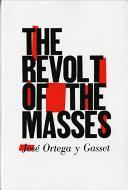Source: The Revolt of the Masses (1929), Chapter XIV: Who Rules The World?
Context: No one knows toward what center human things are going to gravitate in the near future, and hence the life of the world has become scandalously provisional. Everything that today is done in public and in private — even in one's inner conscience — is provisional, the only exception being certain portions of certain sciences. He will be a wise man who puts no trust in all that is proclaimed, upheld, essayed, and lauded at the present day. All that will disappear as quickly as it came. All of it, from the mania for physical sports (the mania, not the sports themselves) to political violence; from "new art" to sun-baths at idiotic fashionable watering-places. Nothing of all that has any roots; it is all pure invention, in the bad sense of the word, which makes it equivalent to fickle caprice. It is not a creation based on the solid substratum of life; it is not a genuine impulse or need. In a word, from the point of view of life it is false.
We are in presence of the contradiction of a style of living which cultivates sincerity and is at the same time a fraud. There is truth only in an existence which feels its acts as irrevocably necessary. There exists today no politician who feels the inevitableness of his policy, and the more extreme his attitudes, the more frivolous, the less inspired by destiny they are. The only life with its roots fixed in earth, the only autochthonous life, is that which is made of inevitable acts. All the rest, all that it is in our power to take or to leave or to exchange for something else, is mere falsification of life. Life today is the fruit of an interregnum, of an empty space between two organizations of historical rule — that which was, that which is to be. For this reason it is essentially provisional. Men do not know what institutions to serve in truth; women do not know what type of men they in truth prefer.
The European cannot live unless embarked upon some great unifying enterprise. When this is lacking, he becomes degraded, grows slack, his soul is paralyzed. We have a commencement of this before our eyes today. The groups which up to today have been known as nations arrived about a century ago at their highest point of expansion. Nothing more can be done with them except lead them to a higher evolution. They are now mere past accumulating all around Europe, weighing it down, imprisoning it. With more vital freedom than ever, we feel that we cannot breathe the air within our nations, because it is confined air. What was before a nation open to all the winds of heaven, has turned into something provincial, an enclosing space.

